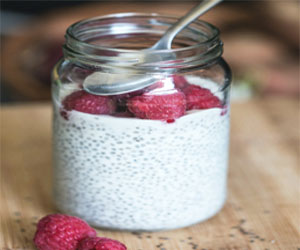


Nurturing Your Digestive Health

Our gut plays a pivotal role in our overall health, and maintaining a happy gut is key to well-being. The concept of "superfoods" has gained popularity due to their exceptional nutrient density, and they can significantly contribute to a healthy digestive system. A happy gut is not only essential for proper digestion but also for a strong immune system and optimal nutrient absorption. Let's explore how superfoods can support your gut health.
Fiber-Rich Foods: Superfoods like chia seeds, flaxseeds, and oats are excellent sources of soluble and insoluble fiber. Fiber acts as a natural digestive aid by promoting regular bowel movements and preventing constipation. It also supports the growth of beneficial gut bacteria.
Greek Yogurt: This probiotic-rich food contains live active cultures that support a balanced gut microbiome. Probiotics are "good" bacteria that help maintain a healthy gut environment and aid in digestion.
Kimchi And Fermented Foods: Fermented superfoods like kimchi, sauerkraut, and kefir are packed with probiotics, making them a must for promoting gut health. These live cultures improve digestion, reduce inflammation, and enhance nutrient absorption.
Berries: Blueberries and raspberries are high in fiber and antioxidants. The fiber supports a healthy digestive system, while antioxidants reduce inflammation and protect the gut lining.
Ginger: Known for its anti-inflammatory properties, ginger can help reduce digestive discomfort and soothe an upset stomach. It's commonly used to relieve indigestion and nausea.
Turmeric: Curcumin, the active compound in turmeric, has anti-inflammatory and antioxidant properties. It can help alleviate symptoms of irritable bowel syndrome (IBS) and other digestive disorders.
Avocado: Rich in fiber and healthy fats, avocados support the digestive process and reduce the risk of developing constipation.
Legumes: Lentils, chickpeas, and beans are excellent sources of fiber and protein. They promote regular bowel movements and provide sustenance to beneficial gut bacteria.
Leafy Greens: Spinach, kale, and other greens contain high levels of chlorophyll, which can help reduce digestive inflammation and support the healing of the gut lining.
Bone Broth: Bone broth contains essential nutrients like collagen and gelatin, which can help repair and soothe the gut lining. It's often used in gut-healing diets.
Maintaining a happy gut is not just about incorporating these superfoods into your diet; it also involves avoiding or limiting processed foods, excessive sugar, and artificial additives, which can negatively impact gut health. Additionally, staying hydrated and managing stress are essential for a well-functioning digestive system.
Balancing your gut microbiome, the diverse community of microorganisms living in your digestive tract, is crucial for digestive health. Superfoods that support gut bacteria, like those rich in fiber and probiotics, can play a significant role in achieving this balance.
Superfoods are a valuable tool for achieving a happy gut. Their nutrient density and digestive benefits can help you maintain a healthy and efficient digestive system. By incorporating these foods into your diet, along with other healthy lifestyle choices, you can nurture your gut and enjoy the many benefits of improved digestive health.
A Harmonious Journey To Well-Being
 Mental And Emotional Health
Mental And Emotional Health
Cultivating inner peace is a powerful antidote to the stress and anxiety that often plague our lives. By practicing mindfulness, meditation, and self-awareness, we can gain control over our thoughts and emotions. This allows us to respond to life's challenges with greater resilience and composure. It's a vital aspect of holistic health that nurtures our mental and emotional well-being.
Physical Health
The mind and body are interconnected, and the state of your mind has a direct impact on your physical health. Chronic stress and emotional turmoil can lead to physical ailments, ranging from headaches to more serious conditions. By achieving inner peace, you can reduce the physical toll that stress and negativity take on your body. This results in improved overall health and well-being.
Spiritual Connection
Inner peace also plays a significant role in nurturing your spiritual connection. It can deepen your sense of purpose and connection to something greater than yourself. This spirituality provides a wellspring of inner strength and resilience when facing life's challenges.


A Journey To Better Health
 2. Assess Your Reasons: Determine the driving factors behind your decision to transition to a gluten-free lifestyle. Whether it's due to a medical condition like celiac disease or non-celiac gluten sensitivity, or a choice for improved well-being, having clarity about your motivation can help you stay committed to the change.
2. Assess Your Reasons: Determine the driving factors behind your decision to transition to a gluten-free lifestyle. Whether it's due to a medical condition like celiac disease or non-celiac gluten sensitivity, or a choice for improved well-being, having clarity about your motivation can help you stay committed to the change.
3. Consult A Healthcare Professional: If you suspect you have a gluten-related medical condition, consult a healthcare professional for testing and diagnosis. They can provide guidance on the necessity of a gluten-free lifestyle and any specific dietary restrictions.
4. Read Labels Carefully: Effective label reading is essential for identifying gluten-free foods. Look for products that are explicitly labeled as "gluten-free." Also, educate yourself about potential hidden sources of gluten in ingredient lists.
5. Embrace Naturally Gluten-Free Foods: Naturally gluten-free foods include fruits, vegetables, lean proteins, and gluten-free grains like rice and quinoa. These items form the foundation of a nutritious gluten-free diet.
6. Stock Your Kitchen: Ensure your kitchen is well-stocked with gluten-free essentials. This includes gluten-free grains, gluten-free flours for baking, gluten-free pasta, and a variety of gluten-free snacks.
7. Experiment With Recipes: Transitioning to a gluten-free lifestyle provides an opportunity to explore new recipes and culinary techniques. Experiment with gluten-free flours and discover new flavors and textures that are unique to this way of eating.
8. Be Cautious Of Cross-Contamination: Cross-contamination can be a challenge, especially if you share a kitchen with gluten-eating family members. It's crucial to avoid any accidental contact between gluten and gluten-free foods. Implement dedicated kitchen utensils and thoroughly clean surfaces.
A Path To Thriving
 The Role Of Positive Psychology In Resilience
The Role Of Positive Psychology In Resilience
Positive psychology examines the factors that contribute to human happiness, well-being, and optimal functioning. In the context of resilience, positive psychology emphasizes the cultivation of positive emotions, character strengths, and a positive mindset. Here's how positive psychology can aid in building resilience:
Fostering Positive Emotions: Positive psychology emphasizes the importance of cultivating positive emotions such as gratitude, hope, and joy. These emotions can serve as emotional resources during challenging times, promoting resilience.
Identifying Strengths: Positive psychology encourages individuals to recognize and leverage their character strengths. By utilizing these strengths, individuals can overcome adversity more effectively.
Developing A Growth Mindset: Positive psychology emphasizes the power of a growth mindset, which involves viewing challenges as opportunities for growth and learning. This mindset is closely tied to resilience.
Enhancing Psychological Well-Being: Positive psychology interventions, such as mindfulness and gratitude exercises, can improve psychological well-being, which is associated with increased resilience.
Practical Steps For Building Resilience Through Positive Psychology
Cultivate Gratitude: Regularly practice gratitude by acknowledging and appreciating the positive aspects of your life. Keeping a gratitude journal is an effective way to develop this skill.
Foster Optimism: Train your mind to focus on positive outcomes and expect the best, even in challenging situations. Challenge negative self-talk and pessimism with more optimistic thinking patterns.






The Power Of Thankfulness

At the heart of gratitude is the acknowledgment of the good things we have, rather than dwelling on what we lack. This shift in focus can be a game-changer in the pursuit of happiness. Gratitude helps us see the glass as half full, fostering a more positive outlook on life. When we practice gratitude, we consciously reflect on the blessings, big or small, that surround us. This act of reflection can enhance our perception of life's abundance and the joy it brings.
Scientific studies have shed light on the connection between gratitude and happiness. Researchers have found that individuals who regularly practice gratitude tend to experience higher levels of life satisfaction and overall happiness. Gratitude activates the brain's reward system, releasing feel-good neurotransmitters like dopamine and serotonin, which contribute to feelings of joy and contentment.
Furthermore, gratitude can act as a buffer against stress and negative emotions. It helps us build resilience by promoting a positive perspective even in challenging situations. When we're confronted with difficulties, acknowledging the things we're grateful for can provide a sense of perspective and emotional stability, making it easier to navigate life's ups and downs.
Fueling Performance And Recovery
 Quinoa: Known as the "mother of all grains," quinoa is a complete protein source. It contains all nine essential amino acids, making it an ideal choice for muscle recovery and growth. Quinoa is also rich in complex carbohydrates, providing sustained energy for workouts.
Quinoa: Known as the "mother of all grains," quinoa is a complete protein source. It contains all nine essential amino acids, making it an ideal choice for muscle recovery and growth. Quinoa is also rich in complex carbohydrates, providing sustained energy for workouts.
Berries: Blueberries, strawberries, and raspberries are packed with antioxidants, which combat oxidative stress induced by exercise. The antioxidants can help reduce muscle soreness and inflammation, accelerating recovery.
Salmon: Fatty fish like salmon are abundant in omega-3 fatty acids, which have anti-inflammatory properties. Omega-3s can reduce exercise-induced muscle damage and promote joint health, critical for athletes and fitness enthusiasts.
Spinach: Spinach is a leafy green powerhouse, offering a wide range of vitamins and minerals, including iron, which is essential for oxygen transport in the body. This is particularly important for endurance athletes.
Chia Seeds: Chia seeds are high in fiber, healthy fats, and plant-based protein. They provide long-lasting energy and can help maintain hydration due to their water-absorbing properties.
Bananas: These fruits are packed with potassium, an electrolyte crucial for muscle and nerve function. Eating a banana can help prevent cramps during or after intense workouts.
Sweet Potatoes: Sweet potatoes are a complex carbohydrate source that provides a sustained release of energy. They are rich in vitamins and minerals that support muscle recovery.
Nuts And Seeds: Almonds, walnuts, and pumpkin seeds are excellent sources of protein and healthy fats. They provide a quick energy boost and can be a convenient post-workout snack.
Greek Yogurt: Greek yogurt is high in protein and probiotics, which support muscle recovery and gut health. A healthy gut is crucial for nutrient absorption and overall well-being.
Turmeric: Curcumin, the active compound in turmeric, has anti-inflammatory properties. It can help alleviate exercise-induced inflammation and muscle soreness.